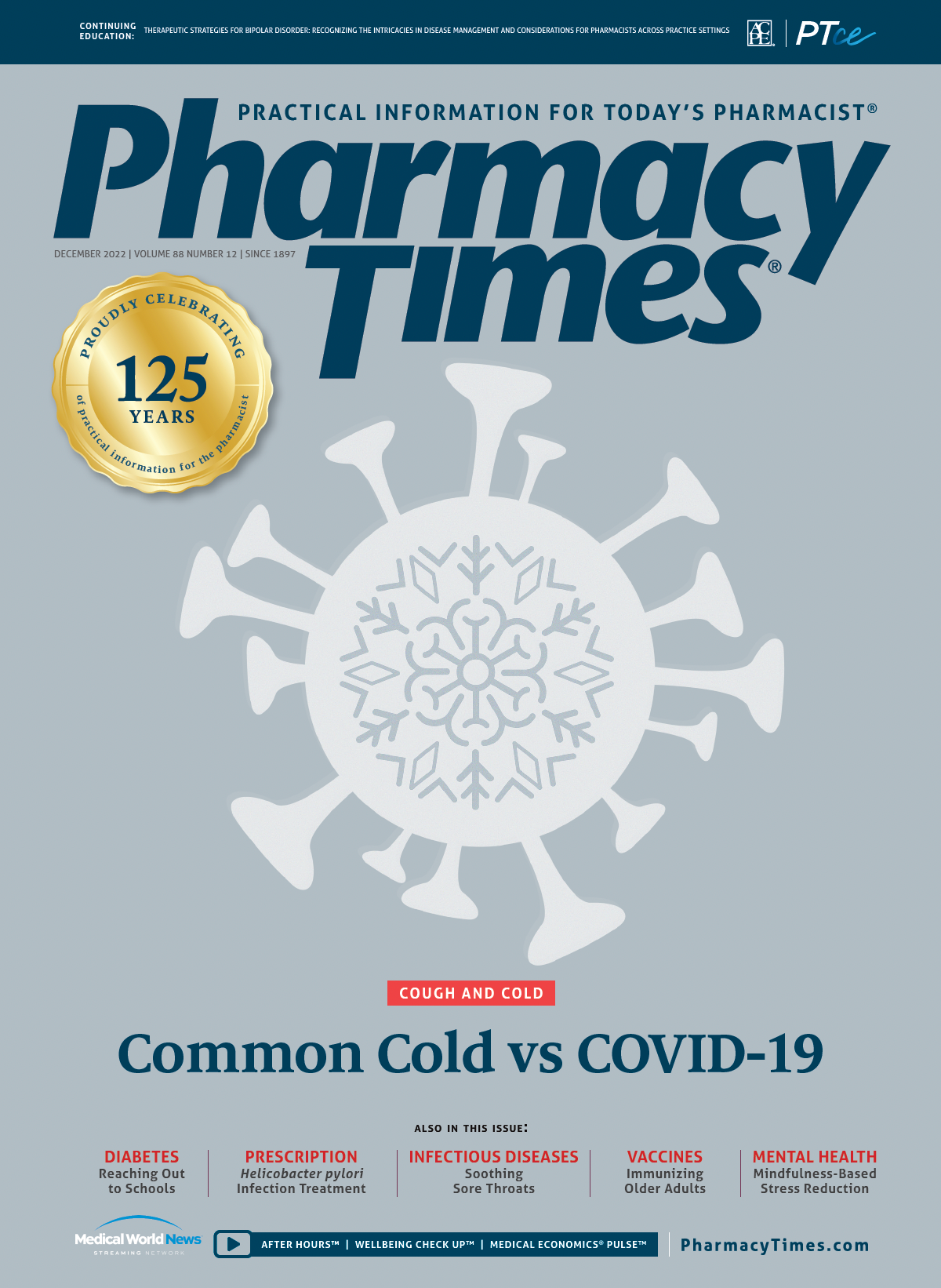Publication
Article
Pharmacy Times
OTC Case Studies: Heart Health
Case 1: Aspirin and Diabetes
Q: LH is a 52-year-old woman who is filling her new prescription for atorvastatin. She is considering taking aspirin at 81 mg daily for her heart health. LH has hypertension and type 2 diabetes and recently found out she has high cholesterol. A few years ago, her primary care physician (PCP) recommended she take baby aspirin every day. LH never did so, but having learned she has high cholesterol, she is contemplating taking the baby aspirin. She has no prior cardiac events. What should the pharmacist recommend to LH?
A: Aspirin therapy has benefits as well as risks. Primary prevention with aspirin therapy is recommended in adults 50 years or older who have diabetes and at least 1 additional major risk factor, including a family history of premature cardiovascular disease, albuminuria, chronic kidney disease, dyslipidemia, hypertension, and smoking. Prior to initiating aspirin therapy, evaluate patients for an increase of bleeding risk, such as anemia, older age, and renal disease. Patients 70 years or older may not benefit because the risk of bleeding outweighs the advantages. Because LH has diabetes with dyslipidemia and hypertension, she may benefit from taking 1 dose of baby aspirin daily. She should discuss this with her PCP before initiation, because it has been more than a year since the last recommendation.1
Case 2: Hypertension and NSAIDs
Q: RD is a 58-year-old man who is looking for an arthritis treatment. His primary care physician told him to take an OTC pain reliever, but RD has not tried this. He has high blood pressure (BP) and takes 2 medications to manage this condition. RD checks his BP regularly. It is usually normal, although it can fluctuate when he is stressed. What should the pharmacist recommend?
A: Because RD has hypertension and no other medical conditions, it would be beneficial to avoid any nonsteroidal anti-inflammatory drugs such as ibuprofen or naproxen, which increase BP by decreasing kidney function and making the body retain fluid. Study results show that the average increase in BP is 3/2 mm Hg,2,3 although this increase varies among patients. Therefore, it would be beneficial to start with alternative options. In this case, RD can try acetaminophen and see whether it relieves his arthritis. Depending on the location of the arthritis, other options may be available, such as a prescription pain product or topical capsaicin.
Case 3: Cardiovascular Disease and Pneumococcal Vaccine
Q: GG is a 65-year-old woman who is receiving her annual influenza vaccination. She recently received a diagnosis of heart failure. GG is trying to get her immunizations up-to-date and has never received a pneumococcal vaccine. GG would like to receive both the influenza and pneumococcal vaccines. Because there are multiple formulations, which vaccines should the pharmacist recommend?
A: The Advisory Committee on Immunization Practices (ACIP) changed the influenza vaccine recommendations for patients 65 years or older for the 2022/2023 season. Because GG is 65 years old, she would benefit from the quadrivalent adjuvanted inactivated influenza vaccine, the quadrivalent high-dose inactivated influenza vaccine, or the quadrivalent recombinant influenza vaccine. If the pharmacy does not have any of these vaccines, any other age-appropriate influenza vaccines would be recommended.4 For her pneumococcal vaccine, the ACIP recommends the pneumococcal 15-valent conjugate vaccine (PCV15) or pneumococcal 20-valent conjugate vaccine (PCV20) for PCV-naïve adults 65 years or older or PCV-naïve adults aged 19 to 64 years with certain underlying conditions. GG can receive the vaccine regardless of her heart failure diagnosis. If PCV15 is used, a dose of pneumococcal polysaccharide vaccine (PPSV23) should be administered at least 1 year later. Both vaccines would be appropriate for GG, so she can decide whether she would like 2 vaccines in 1 year or to be done after the PCV20 vaccine. For those who receive the PCV15 vaccine followed by the PPSV23 vaccine, a minimum interval of 8 weeks can be considered for adults who are immunocompromised or have a cerebrospinal fluid leak or cochlear implant.5
Case 4: Omega-3 Fish Oil
Q: IL is a 48-year-old man who is looking for omega-3 fish oil. He takes 10 mg of atorvastatin at bedtime. His primary care physician recommended that IL begin taking OTC omega-3 fish oil supplements because his triglyceride levels are slightly high. IL is confused about how much he should take because different brands have different dosing. He is also debating increasing his fish intake instead of taking a supplement. What should the pharmacist recommend?
A: Fish oil supplements typically provide 300 mg per capsule, although doses can vary based on manufacturer. Omega-3 content through dietary sources, such as fish, can also vary. Cold-water fatty fish such as herring, salmon, sardines, and tuna contain high amounts of omega-3 fish oil, whereas fish with a lower fat content such as bass, cod, and tilapia contain lower levels. The National Institutes of Health suggests consuming 1.1 to 1.6 g of omega-3 fish oil daily as part of a normal diet. To get an effective dosage for managing hypertriglyceridemia, IL would need to take 2 to 4 g daily.6 To receive the high doses of omega-3 fish oil needed, supplementation is his best option.
About the Authors
Rupal Patel Mansukhani, PharmD, FAPhA, NCTTP, is a clinical associate professor of pharmacy practice and administration at the Ernest Mario School of Pharmacy at Rutgers University in Piscataway and a transitions-of-care clinical pharmacist at Morristown Medical Center, both in New Jersey.
Ammie Patel, PharmD, BCACP, BCPS, is a clinical assistant professor of pharmacy practice and administration at Ernest Mario School of Pharmacy at Rutgers University in Piscataway and a clinical pharmacist in ambulatory care at RWJBarnabas Health in Shrewsbury and Eatontown, all in New Jersey.

Newsletter
Stay informed on drug updates, treatment guidelines, and pharmacy practice trends—subscribe to Pharmacy Times for weekly clinical insights.






